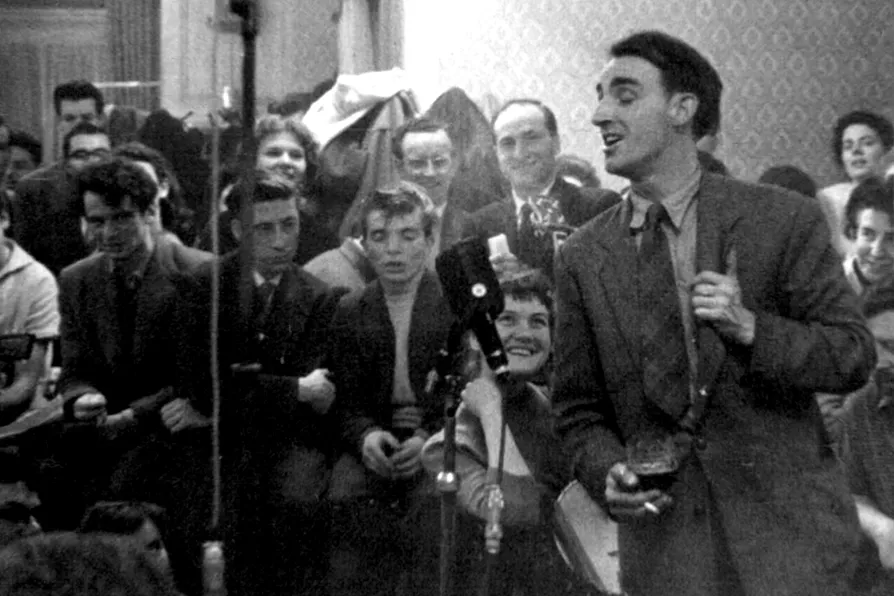RITA DI SANTO points out the social experience of exploitation and oppression that inform the popular winners at this year’s festival
Error message
An error occurred while searching, try again later.DAVID MCKINSTRY appreciates the life and art of writer, songwriter, singer, socialist and Republican, Dominic Behan

 Dominic Behan, in full flight, 1950s, Glasgow [Pic: Courtesy of The Irish Voice]
Dominic Behan, in full flight, 1950s, Glasgow [Pic: Courtesy of The Irish Voice]
https://www.youtube.com/watch?v=Y0Woq3CyH1k
“COME all ye young rebels and list while I sing/ for love of one’s country is a terrible thing…”
Who reading this has not heard or indeed sang these words? The lyrics and tune of The Patriot Game are so potent in their melodious melancholy that the Nobel laureate Bob Dylan borrowed, or stole the tune, depending on your interpretation, for his anthemic With God On Our Side.
The Patriot Game was penned by a mercurial Irishman who chose to live in the southside of Glasgow among his fellow Irish, the Writer in Residence for Strathclyde Regional Council who brought literature, poetry and song to the bairns of the West of Scotland. His name was Dominic Behan.
Born in Dublin on October 22 1928, into a staunchly Republican family, his maternal uncle, Peadar Kearney, wrote The Soldier’s Song and his father, Stephen, was one of Michael Collins’s legendary Twelve Apostles. During the War of Independence, this elite military organisation was responsible for the deaths of numerous British intelligence officers. Dominic would write a fitting tribute to his father’s bravery during the period by penning Come Out, Ye Black and Tans.
The military bravery of Behan’s father was matched by the literary talent of his mother. It was hardly surprising that not only Dominic and Brendan, but also Brian, all became writers. Indeed, such was the international renown of the Behan brothers, that when their father was asked by a reporter, when he himself would produce a play owing to the success of his sons, Stephen Behan quipped: “Why should I produce plays when I produce playwrights?”
The road to literary prominence began in the 1940s when Dominic, still a teenager, began to pen his first poems in the IRA’s youth organisation’s magazine Fianna: The Voice of Youth Ireland. However, the young Behan was no romantic Republican, but sang from the same socialist hymn sheet as James Connolly — for him lyrics and social activism were different verses of the same song. In 1952, he was arrested and jailed for leading a civil disobedience campaign to protest against Eamon de Valeria’s Fianna Fail government’s unwillingness to tackle unemployment. Upon his release he headed for Glasgow. There, he became close friends with Hugh MacDiarmid.
It was during this creative three-year period Behan began to work on his first play, the acclaimed Posterity Be Damned, which deals with IRA activism after the civil war. When the play premiered in Dublin in 1959, it was met with great acclaim, much to the chagrin of his elder brother Brendan.
Although, Glasgow would always be his home, during the 1960s he spent time in London writing for the BBC, and the self-educated Dubliner was able to collaborate across social boundaries and worked successfully on many broadcasts with the Oxford-educated Ulsterman Louis MacNeice.
It was during this time that Behan wrote a score of plays for television including screenplays for the BBC flagship programme Play for Today. His drama The Folk Singer focused on the sectarian roots of the conflict in the north of Ireland and was a critical success, starring the young Ken Stott.
During early 1970s, when the violence was at its height, Behan — never an armchair Republican — was pivotal in setting up and funding a summer school in Meath with the aim of to bringing Catholic and Protestant youths together with the intent of breaking down sectarian barriers.
Dominic’s commitment to children’s education extended beyond his native land. During the 1980s, he became the Writer in Residence for Strathclyde Regional Council and toured the region’s schools to promote literature and song.
He published 450 songs in his lifetime. Dominic worked closely with the Dubliners, adapting and writing folk classics such as MacAlpine’s Fusiliers and Avondale.
These standards crossed musical boundaries and, at the height of Beatlemania, John Lennon praised the Irish folk scene in general but also singled out Behan for his songwriting talent. In 1966, the Irish folk group The Ludlows were at number one in the UK charts for four weeks with The Sea Around Us. The song did not pull its punches with regards to British involvement in Ireland. Its lyrics included the lines: “Two foreign old monarchs in battle did join/ each wanting each head on the back of a coin/ if the Irish had sense, they’d drown both in the Boyne/ and partition throw into the ocean.” Again, Behan was able to merge melody and message to shine a light on the history of British involvement in Ireland.
He died in 1989 of pancreatic cancer, aged just 60. Fittingly, Behan, was best described by his fellow writer Jack McLean: “He was half-Glaswegian and all Irishman.”
Dr David McKinstry is a teacher and poet whose poems are widely published and broadcast across Ireland and in the UK. If any readers wish to share their literary output with him, they can contact him at: davmick38h@yahoo.co.uk










